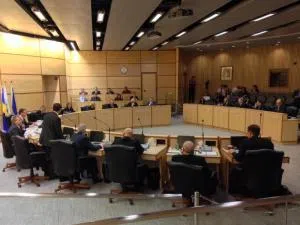
Regina reduces proposed property tax increase to 5.88%
City council has managed to shave a little bit off a proposed seven per cent property tax increase, despite calls from more than a dozen people asking for more and different spending.
A special budget meeting was held at City Hall Monday evening. After some last-minute maneuvers by councillors, the proposed tax hike was brought down to 5.88 per cent. Combined with an eight per cent increase in water and sewer utility rates, that means an average household will have to pay roughly $240 more a year.
While councillors heard from more than a dozen presenters in chambers, it was the calls and conversations they had in the last three weeks outside City Hall that swayed them. Several councillors insisted that their constituents had pushed them hard to reduce the proposed increase.
“Bit of a sticker shock, a bit strong, a bit too quick on it,” said Mayor Michael Fougere after the meeting, characterizing people’s reaction to the initial plan. “They told us seven per cent is a lot. Council said, ‘We agree with you,’ and we made some changes accordingly that didn’t take away from the fabric of the discussion.”


